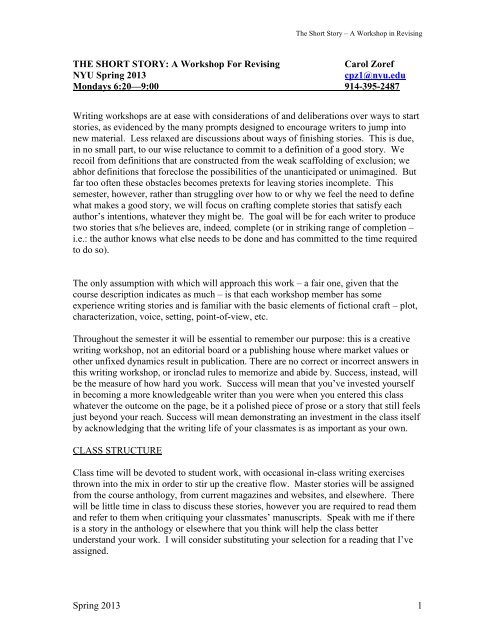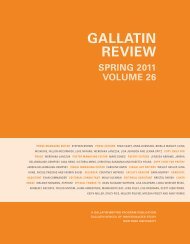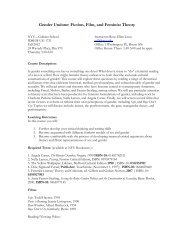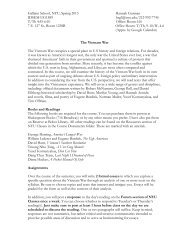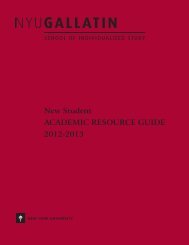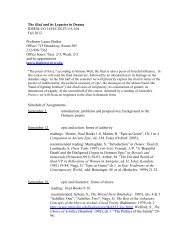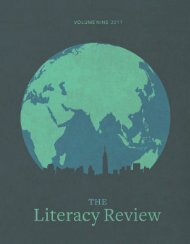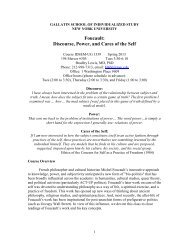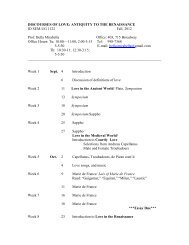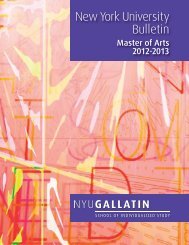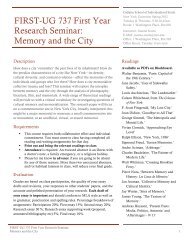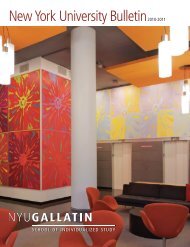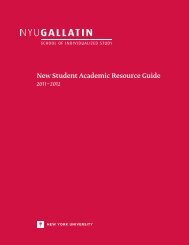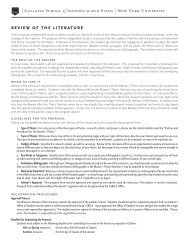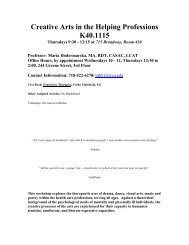READING & WRITING THE SHORT STORY
READING & WRITING THE SHORT STORY
READING & WRITING THE SHORT STORY
You also want an ePaper? Increase the reach of your titles
YUMPU automatically turns print PDFs into web optimized ePapers that Google loves.
The Short Story – A Workshop in Revising<strong>THE</strong> <strong>SHORT</strong> <strong>STORY</strong>: A Workshop For RevisingCarol ZorefNYU Spring 2013cpz1@nyu.eduMondays 6:20—9:00 914-395-2487Writing workshops are at ease with considerations of and deliberations over ways to startstories, as evidenced by the many prompts designed to encourage writers to jump intonew material. Less relaxed are discussions about ways of finishing stories. This is due,in no small part, to our wise reluctance to commit to a definition of a good story. Werecoil from definitions that are constructed from the weak scaffolding of exclusion; weabhor definitions that foreclose the possibilities of the unanticipated or unimagined. Butfar too often these obstacles becomes pretexts for leaving stories incomplete. Thissemester, however, rather than struggling over how to or why we feel the need to definewhat makes a good story, we will focus on crafting complete stories that satisfy eachauthor’s intentions, whatever they might be. The goal will be for each writer to producetwo stories that s/he believes are, indeed, complete (or in striking range of completion –i.e.: the author knows what else needs to be done and has committed to the time requiredto do so).The only assumption with which will approach this work – a fair one, given that thecourse description indicates as much – is that each workshop member has someexperience writing stories and is familiar with the basic elements of fictional craft – plot,characterization, voice, setting, point-of-view, etc.Throughout the semester it will be essential to remember our purpose: this is a creativewriting workshop, not an editorial board or a publishing house where market values orother unfixed dynamics result in publication. There are no correct or incorrect answers inthis writing workshop, or ironclad rules to memorize and abide by. Success, instead, willbe the measure of how hard you work. Success will mean that you’ve invested yourselfin becoming a more knowledgeable writer than you were when you entered this classwhatever the outcome on the page, be it a polished piece of prose or a story that still feelsjust beyond your reach. Success will mean demonstrating an investment in the class itselfby acknowledging that the writing life of your classmates is as important as your own.CLASS STRUCTUREClass time will be devoted to student work, with occasional in-class writing exercisesthrown into the mix in order to stir up the creative flow. Master stories will be assignedfrom the course anthology, from current magazines and websites, and elsewhere. Therewill be little time in class to discuss these stories, however you are required to read themand refer to them when critiquing your classmates’ manuscripts. Speak with me if thereis a story in the anthology or elsewhere that you think will help the class betterunderstand your work. I will consider substituting your selection for a reading that I’veassigned.Spring 2013 1
The Short Story – A Workshop in RevisingActive, thoughtful, and serious participation by all students is fundamental to yourlearning process and to the success of these discussions. The quality of this participationwill represent a significant portion of your final grade. This does not mean that you mustspeak at great length; rather, you should comment on specific aspects of your classmates’stories in order to help them to identify what you believe are their strengths as well asspecific opportunities for further development.<strong>WRITING</strong> REQUIREMENTSStories-In-ProgressYou are required to produce two stories this semester. You will be writing 3 versions ofeach story, for a total of 6 required submissions. One version of each story will bepresented in class; the other two versions will be handed in to me. You will work yourfirst story until spring break. You will work on your second story for the balance of theterm. I will be assigning personal due dates to each of you for your own stories. This isless confusing than it sounds so long as you follow the schedule.Workshop Manuscripts (must be distributed to the entire class in printed form—noemailing except by my request)Each student will on 2 occasions present longer, original manuscripts in class forworkshop discussion. You are free to write about anything you chose. These manuscriptsshould run somewhere between 8-12 pages, doubled-spaced, 12-point font. Thesemanuscripts should be thoroughly proof read and corrected prior to distribution.Discussions about manuscripts containing recurrent grammar and punctuation errorsoften get sidelined by grumbling about mechanics rather than focusing, as they should forthe sake of the writer, on the story being told. Spell Check and Grammar Check highlightmany errors, but there is no better method for finding errors than reading your own workaloud. (Make certain that your Spell Check is set to Formal.)If your story is much longer than 12 pages, ask yourself if you have included more thanyou need, if you are unnecessarily repeating material, or if you have gone off topic. Ifyour manuscript is much shorter than 8 pages, ask yourself if your story is fullydeveloped, or if there’s more to add that would enrich the story that you’re looking to tell.There is no magic number of pages that constitute a short story – or a novel, for thatmatter. I do, however, want you to experience the authority of a fully developed story.Likewise, while many short stories run longer than 12 pages, I want you experience theshort story as an art of condensation, as opposed to the novelistic world of elaboration.On a practical note, it too often isn’t possible to give due diligence to the workshopstories at hand as well devote ample time to writing your own stories when reading longmanuscripts in a workshop of this size.Spring 2013 2
The Short Story – A Workshop in RevisingWorkshop Story Critiques (e-mail to me before class every week)When you are reading the work of your classmates, do so with pen in hand and makesuccinct and legible notes on the manuscript. Also write a brief, narrative response to thework – a paragraph will suffice – in which you focus on some specific aspect of the storywith respect to the manner in which it is crafted. While all authors appreciatecomplements, be sure to use these critiques as an opportunity to identify what you believeis the point of the story, as well as the way in which the author might enrich their storythrough the further employment of an element of craft. For example: Is the dialoguemoving the forward story, or is it merely filler? Is it possible to distinguish one characterfrom another, or should the author further develop attributes of characterization. Whichones? Try to be as specific as you can and as constructive as possible.Print out your comments and give to the author along with your annotated copy of theirmanuscript. Be certain to sign your comments on both the manuscript and your note.Also e-mail a copy of your comments to me no later than 9 a.m. on the day of class.Write or paste your comments into the body of the e-mail (do not send as attachments).<strong>READING</strong>Published StoriesMost weeks, I will assign one published short story. Most of these stories are containedin the required anthology The Art of the Short Story (Goia, etc., editors). Other stories,etc. will be available on-line as PDFs or links, as indicated. Bring your anthology to classevery week so that you can refer to the stories during discussions.Spring 2013 3
The Short Story – A Workshop in RevisingNUTS & BOLTSGradesEarning an excellent grade in this class is simply a matter of working very hard. All thatI ask is that you work with serious intention (even when writing humorously) on all ofyour creative writing assignments and critiques; hand in all of your writing assignmentson time; closely read all of the assigned stories; be an active and purposeful contributor toclass discussions and have at least a very good if not perfect attendance record. Aspointed out earlier, a writing workshop is not a publishing house. The goal is to learnabout story writing by writing stories. In fact, you can earn an excellent grade even ifyour 2 stories don’t yet achieve all that you wish for them.What will make it impossible to get a good grade?• Missing deadlines. You only have six crucial deadlines for material this semester.These dates are the equivalents of exams. Regrettably, missing a deadline willresult in a reduction of your final grade. You must distribute your workshopmanuscript in class on the two dates that you are scheduled to do so, unless I haveasked that you email them. If you are sick, have a friend hand deliver them.• Having an attitude that undermines the esprit d’ corps of the workshop. Pleaseleave all attitude far away from this workshop.AttendanceWe only meet once a week, which doesn’t afford wiggle room for absences. If you haveto miss a class due to illness or an emergency, let me know by email. You will still beresponsible for returning annotated workshop stories to your classmates, along with thenarrative commentary that you also email to me. Unfortunately, it won’t be possible foryou to receive a passing grade if you miss 3 classes or more. Speak to me if youanticipate missing 3 classes so that we can be in touch with one of the deans aboutfinding a way to help you work this out.On a final note, be on time to class. If you arrive late, wait outside in the hallway ratherthan opening the door and letting yourself in. Don’t wander off, because you will beinvited into the room when we reach a natural break in the action, much in the way thattheater goers who arrive late are ushered to their seats between scenes. Because of thenature of the workshop environment, it’s far too disruptive waiting for latecomers to getthemselves settled. Two late arrivals to class or late returns from break equal oneabsence. Speak to me if you have another class that ends right before ours meets and youhave to get to Tisch from some distant NYU location. We’ll see if there’s a way to workit out.Spring 2013 4
The Short Story – A Workshop in RevisingBreaksOne break is scheduled at some point during class, obviating the need for anyone to leavethe room at other times except for an emergency. Feel free to bring beverages and foodwith you.Cell Phones + Computers + Other ElectronicsRegrettably, this bears repeating: Turn off your cell phones, computers, and otherelectronics during class. If you must be available to receive an emergency call, let meknow in advance so that we can anticipate your leaving the room. Text messaging, websurfing, etc. during class, will be treated as an absence (as well as a crime againsthumanity).Spring 2013 5


